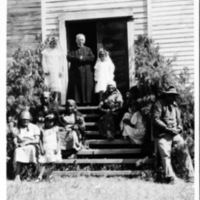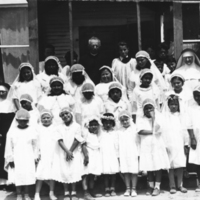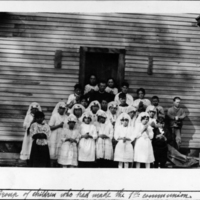Communion
According to the diary of Father Edward Griva (Edward Griva Collection; Oregon Province Archives of the Society of Jesus, Foley Library, Gonzaga University, Spokane, Washington); Mass, Confession, Communion and Confirmation seem to be recurring events taking place in the life of a Jesuit living in the Colombia Plateau. As European settlers invaded the Colombia Plateau, the role of Jesuits was important not only to maintain religion among the white settlers, but also to learn the ways of the Plateau Indians in order to convert them to Christianity. Although there was push back from the Plateau Indians towards the white invaders, they also developed an interest in learning their ways because of the belief that these white settlers possessed spiritual powers. During the time Europeans colonized the Americas, the white settlers brought with them not only foreign resources but also many diseases, which killed many native people. Many of their shamans, who would normally heal their sick, failed to combat these new diseases. As a result, some Plateau Indians believed if they could learn the spiritual power of the white settler, then, they could use that power to improve the health of their tribe.
During Communion a person receives the Eucharist, which translates to the body of Christ. A person is unable to receive Eucharist until they have completed their First Communion, which can be seen in the pictures [native children completing their First Communion; becoming a part of the Christian community]. Communion can be seen for Plateau Indians as a way of receiving the “spiritual powers” white settlers were perceived to obtain. For example, Griva writes, "September 5th - (first Friday) Heard confessions - said mass - gave holy Communion to many Indians - preached during mass - baptized a baby - went to Orient - took the train and went to Oroville for the first time. September 9 - Heard the confession of all those Indians in their small nice Church - said mass - preached - gave communion - went to bring holy comm. to 2 old Indians” (5-9 September 1913; Edward Griva Collection; Oregon Province Archives of the Society of Jesus, Foley Library, Gonzaga University, Spokane, Washington).



